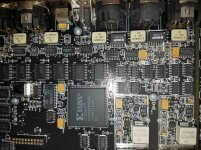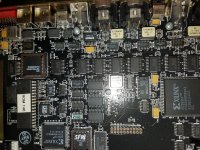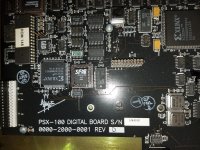Hi All,
My beloved Apogee PSX-100 gradually began to stop synchronizing when using the digital IO and now will no longer lock no matter what. I contacted Apogee asking to repair it and without even attempting to help they said they won't even look at it because they can't get parts. BS.
I've got it open and it's a mess of 74 series logic circuits that is going to be a pain to trace. Although I'm motivated to do so, I just wanted to see if any one has repaired one of these OR a similar product doing the same thing? Any ideas of how to approach this to save some time/effort?
That said, I'm well versed in a lot of areas of audio electronics including embedded, just not digital audio circuitry (low jitter clocks, formats, etc) but I'm positive I can learn it. Is there a book or something on the subject anyone can recommend?
Because what I'm considering, if it turns out an FGPA has failed or something and it really can't be repaired, is to just redesign the digital IO section from scratch. The AD/DA boards are still working fine afaik, and I love the sound of the unit, why not make a DIY project out of it and potentially make it better?
Any other ideas? Hope everyone is staying safe!
My beloved Apogee PSX-100 gradually began to stop synchronizing when using the digital IO and now will no longer lock no matter what. I contacted Apogee asking to repair it and without even attempting to help they said they won't even look at it because they can't get parts. BS.
I've got it open and it's a mess of 74 series logic circuits that is going to be a pain to trace. Although I'm motivated to do so, I just wanted to see if any one has repaired one of these OR a similar product doing the same thing? Any ideas of how to approach this to save some time/effort?
That said, I'm well versed in a lot of areas of audio electronics including embedded, just not digital audio circuitry (low jitter clocks, formats, etc) but I'm positive I can learn it. Is there a book or something on the subject anyone can recommend?
Because what I'm considering, if it turns out an FGPA has failed or something and it really can't be repaired, is to just redesign the digital IO section from scratch. The AD/DA boards are still working fine afaik, and I love the sound of the unit, why not make a DIY project out of it and potentially make it better?
Any other ideas? Hope everyone is staying safe!
See attached. I only spent a bit on it last night but I've got the SPDIF IN through L4 and C102, with R64 as a terminating resistor. It then goes into pin 6 of U58 which is a line driver. Pin 5 is the output of that driver and then it drops of the map. I can't find the next connection within 3in or so!
Attachments
SPDIF and ADAT optical and SPDIF coax all don't work. I don't have anything else with AES to test unfortunately.
This started with the device losing sync randomly, usually overnight. I could cycle through the options and it would sync again, but gradually it became harder to get the sync back until it stopped altogether.
Normally i would assume that to be a cap issue, but i have no concept of how the sync works with digital audio devices, and with a schematic or two to study im flying blind. The internet seemingly lacks schems and info on high end ad/da and interfaces as far as ive seen so far.
This started with the device losing sync randomly, usually overnight. I could cycle through the options and it would sync again, but gradually it became harder to get the sync back until it stopped altogether.
Normally i would assume that to be a cap issue, but i have no concept of how the sync works with digital audio devices, and with a schematic or two to study im flying blind. The internet seemingly lacks schems and info on high end ad/da and interfaces as far as ive seen so far.
Last edited:
What sort of tools have you got ? Are you in a position to test for an output from U58 or whether the correct pins change when you cycle through the inputs ? Have you any freezer spray ?
I've got an analog scope, couple DMMs, freq gen and a USB logic analyzer. No freeze spray but that should be easy enough to get!
Well, just the interface I was using. I do have pieces of gear with SPDIF and ADAT outs I could use as well.
It always manifested as the 'error' led lighting up under the D/A Sync section. Normally flipping through the "D/A Input" options would get it to lock. However, as this issue advanced, I would sometimes have to cycle through the A/D Sync or occasionally toggling the "Optical Output" would get it to work.
So it should be the D/A side, but the A/D side may also play a role...I'm just not versed enough in digital synchronization to know if that extra detail is useful or not.
So it should be the D/A side, but the A/D side may also play a role...I'm just not versed enough in digital synchronization to know if that extra detail is useful or not.
It might be worth trying reseating the microcontroller (U8) and its memory (ROM146). It is unlikely to fix things but its simple to try. After that comes freezer spray and then tracing the clock back from the DAC chip or trying an external sync.
Ok, I'll try that here soon! I've been too concerned about getting you all the information you need that I haven't yet said "thank you" for your help thus far. So thank you for your help thus far. I'll report back.
Ok, so I was able to reseat the ROM but no change. I wasn't able to do the uC because I don't have a PLCC extractor and I didn't want to crack it.
I also tried unsuccessfully to locate where the damn SPDIF trace goes. I'm pretty sure this is a 6-8 layer board so there's no trace to follow.
On the plus side, I was able to get a decent bit of the AD section traced out!
I also tried unsuccessfully to locate where the damn SPDIF trace goes. I'm pretty sure this is a 6-8 layer board so there's no trace to follow.
On the plus side, I was able to get a decent bit of the AD section traced out!
Have you got pictures of the ADC and DAC boards ? It will be easier to trace the respective sync signals back to their source than to trace the SPDIF signal as it has to be decoded before sync. The picture I have of the ADC board shows it to be the CS5396.
- Home
- Source & Line
- Digital Source
- Apogee PSX-100 stopped syncing...



